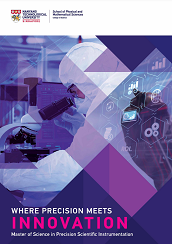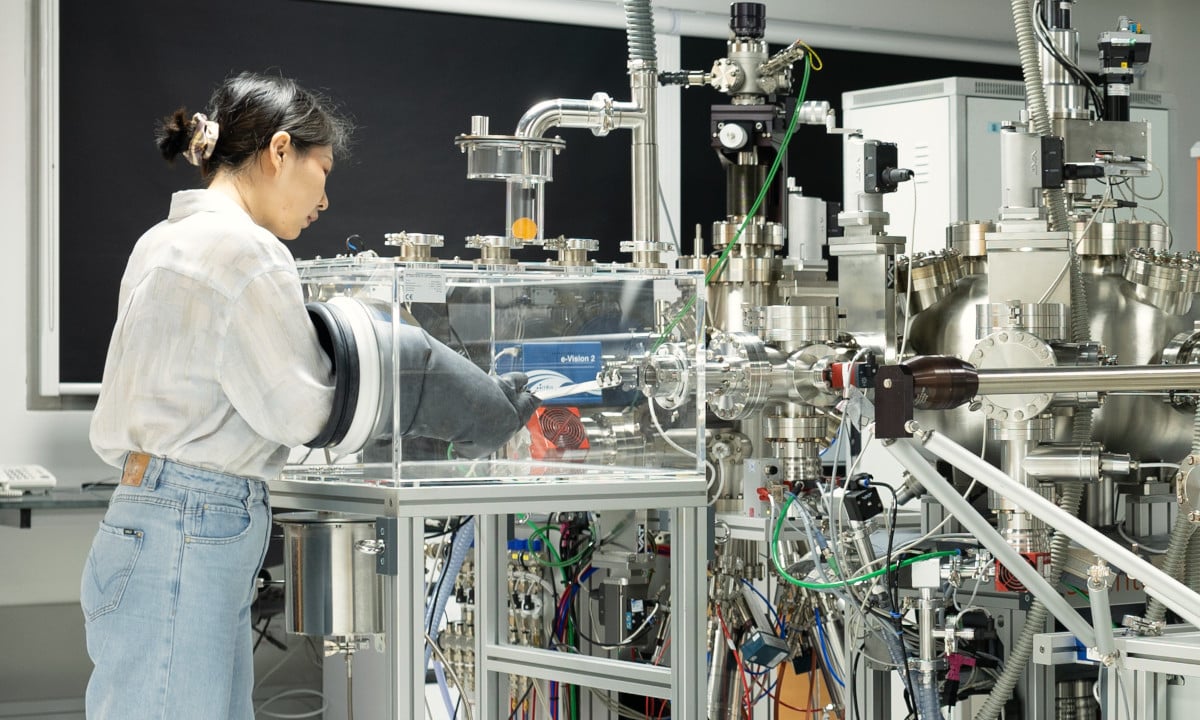Master of Science in Precision Scientific Instrumentation
A coursework-based Master of Science programme covering the principles and operation of advanced technical instrumentation in the physical sciences and high-tech manufacturing.
Quantitative measurements are performed in every area of science, engineering and technology. Modern high-tech enterprises rely on a variety of precision scientific instruments for the design, development, and manufacturing of new products. This programme is suitable for both recent graduates and working professionals in advanced manufacturing industries (semiconductors, non-volatile memory, photonics, etc.).
The Master
of Science in Precision Scientific Instrumentation programme
delves into the fundamental physical principles behind modern scientific
instrumentation, and how to use them. Offered by NTU's School of Physical and Mathematical
Sciences,
the programme incorporates coursework from multiple scientific and engineering
disciplines including solid-state physics, microelectronics, optoelectronics,
and materials science.
The MSc in Precision Scientific Instrumentation (MSPSI) Programme is an intensive one-year full-time or two-year part-time programme by coursework taught in 3 trimesters per academic year. The curriculum comprises four specialisations: Nanotechnology, Chip Technology, Optoelectronics and Quantum Technology. The courses are delivered in intensive periods of 12 weeks. All courses are conducted at the NTU main campus evenings (6:30 PM-10 PM) on weekdays or Saturdays (9:30 AM-1 PM, 2 PM-5:30 PM or Full day).
The programme consists of a total of 32 Academic Units (AU), with 8 AU of compulsory courses, 9 AU from the chosen specialisation (Prescribed Electives), and 15 AU from other Electives courses:
| Compulsory Courses (8 AU) | |
|---|---|
| Compulsory courses | 8 AU |
| Elective Courses (9+15 AU) | |
|---|---|
| Prescribed Electives of the chosen specialisation* | 9 AU |
| Unrestricted Electives | 15 AU |
| Total | 32 AU |
*Prescribed Elective courses of one specialisation could be Unrestricted Elective courses of another specialisation.
Note:
Successful completion of all coursework requirements, with a minimum CGPA of 2.50, is required for completion of the programme.
Course List
Compulsory Courses
Prescribed Electives Courses
Nanotechnology
Nanotechnology in the semiconductor industry has opened new possibilities for developing smaller, more powerful, and more efficient electronic devices. As research in this area continues, we expect to see further advancements. Nanotechnology has significant potential in precision engineering and is expected to play an increasingly important role in developing high-precision components and devices.
| PH6403 Physics of Surfaces and Interfaces | 3 AU |
| PH6404 Physics of Low Dimensional Structures | 3 AU |
| PH6711 Applied Solid State Physics | 3 AU |
Chip Technology
Advancements in chip technology have enabled the development of increasingly powerful and efficient electronic devices. As the demand for smaller and more powerful devices continues to grow, the semiconductor industry must innovate and develop new chip technologies to meet these demands.
| PH6717 Experimental Methodology in Solid State Physics | 3 AU |
| PH6739 Digital Electronics | 3 AU |
| PH6747 Magnetism and Spintronics Devices | 3 AU |
Optoelectronics
The semiconductor industry is continuously innovating and developing new optoelectronic devices and technologies. Nanotechnology has opened up new possibilities for developing optoelectronic devices with greater efficiency and functionality, playing a crucial role in the semiconductor industry. It is expected to continue to grow and evolve in the future.
| PH6730 Advanced Techniques for Spectroscopic Research and Engineering | 3 AU |
| PH6732 Optoelectronic Technology | 3 AU |
| PH6733 Silicon Photonic Chip Technology | 3 AU |
Quantum Technology
Quantum technology is expected to significantly shape future trends in various fields, including computing, communication, sensing, and cryptography. It involves the development and application of quantum systems, devices, and algorithms. As the field of quantum technology continues to mature, It can expect to see new applications and technologies that leverage the power of quantum mechanics to solve some of the semiconductor industry's most pressing problems.
| PH6651 Quantum Information and Quantum Computation | 3 AU |
| PH6652 Quantum Devices for Quantum Communication and Sensing | 3 AU |
| PH6653 Quantum Mysteries and Quantum Mechanics | 3 AU |
Unrestricted Electives Courses
Download brochure for more details















/enri-thumbnails/careeropportunities1f0caf1c-a12d-479c-be7c-3c04e085c617.tmb-mega-menu.jpg?Culture=en&sfvrsn=d7261e3b_1)

/cradle-thumbnails/research-capabilities1516d0ba63aa44f0b4ee77a8c05263b2.tmb-mega-menu.jpg?Culture=en&sfvrsn=1bc94f8_1)

7e6fdc03-9018-4d08-9a98-8a21acbc37ba.tmb-mega-menu.jpg?Culture=en&sfvrsn=7deaf618_1)

